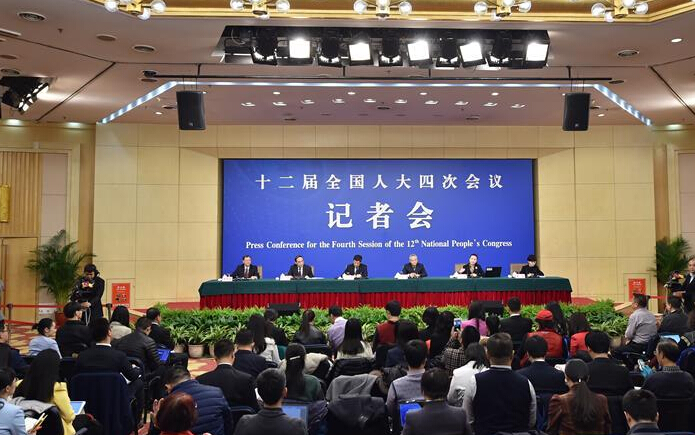Ministers giving more time to reporters than before
 0 Comment(s)
0 Comment(s) Print
Print E-mail China Daily, March 10, 2016
E-mail China Daily, March 10, 2016
There is no better place to watch the media war to cover the "two sessions" than a passage near the northern gate of the Great Hall of the People in Beijing when China's top legislature and political advisory body convene annually.
 |
|
A press conference about legislation progress is held on the sidelines of the fourth session of China's 12th National People's Congress in Beijing, capital of China, March 10, 2016. (Xinhua/Li Xin) |
The 100-meter passage, also known as the Ministers' red carpet, is where ministers have to go before entering the meeting hall and therefore become the targets of constant bursts of camera flashes and a barrage of questions from eager reporters.
Unlike previous years when most of the reporters had a hard time getting time-conscious ministers to give in-depth answers, this year officials willingly spent more time with reporters.
The change came after Premier Li Keqiang ordered officials to address public concerns immediately and make their work transparent to the people.
Every year nearly 3,000 delegates from across the country meet in Beijing for the National People's Congress that lasts roughly two weeks. The NPC's advisory body, the Chinese People's Political Consultative Conference, meets in parallel with the NPC.
The annual sessions, dominating headlines until its curtain falls, also feature legions of reporters from home and abroad. This year more than 5,000 journalists were registered.
Though many delegates are often chased down for interviews, ministers are more favored as news sources especially when it comes to topics of national concern such as pension, education, and tax.
Netease, a major Chinese news portal, published a guide book two years ago teaching rookie reporters how to stop a minister from rushing to the meeting hall and get him or her to talk more.
It seems they will be getting less use out of the book this year.






Go to Forum >>0 Comment(s)